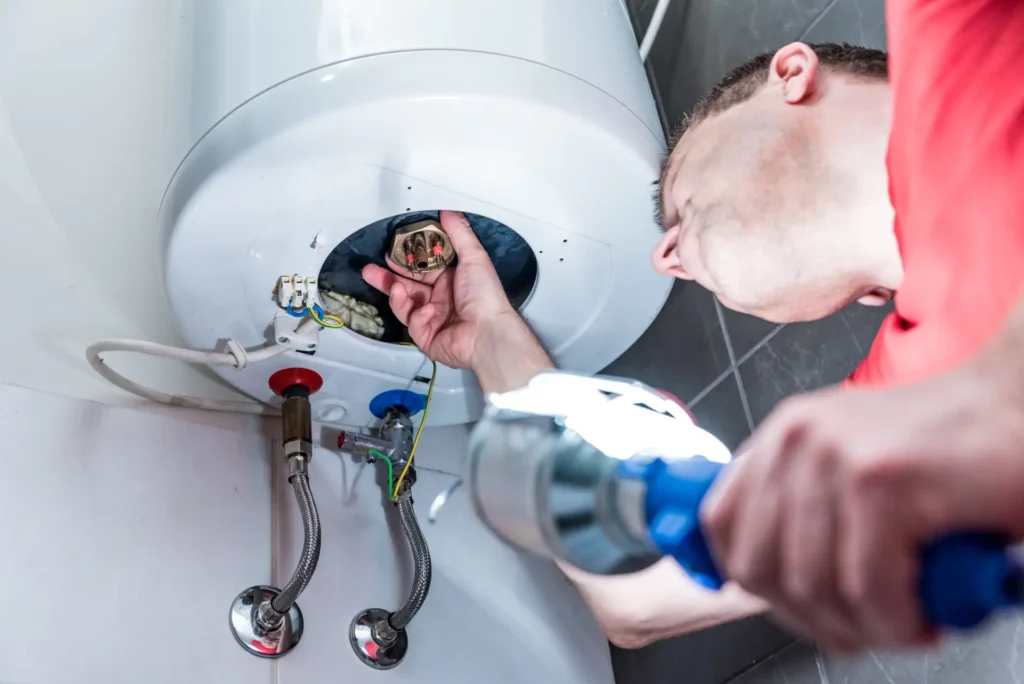
Most people don’t think about their water heater until something goes wrong. Unlike your car, there’s no dashboard light to warn you when it needs repair or is about to fail. But then it happens: you step into the shower expecting heated water and get a freezing surprise instead. Or worse, you come home to find your basement flooded from a leaking tank.
How Your Water Heater Works
Your water heater is the silent workhorse of your home. Every time you wash dishes, run a load of laundry, or take a shower, it’s working behind the scenes to deliver a steady supply of hot water on demand.
Most systems do this by pulling cold water into a tank, heating it with electric or gas elements, and storing it until needed. When you turn on a hot water tap, that heated water flows through your pipes while new cold water refills the tank, keeping the cycle going.
With regular maintenance and timely repairs, a water heater can last for years. But when neglected, it can cause water damage, mold, and even higher energy bills. Small, unresolved issues can suddenly snowball, causing serious damage not just to the appliance, but to your home.
Importance of Water Heater Maintenance
Just because your water heater is out of sight doesn’t mean it should be out of mind. Like any major appliance, it benefits from regular maintenance to keep it running safely and efficiently. Even if your unit is relatively new, consistent care helps it perform better and last longer.
In fact, according to the U.S. Department of Energy, water heating accounts for about 18% of your home’s energy use, which is more than all other appliances combined. So keeping it efficient can also help lower your utility bills.
Water Heater Maintenance Tips
Fortunately, maintenance doesn’t require much. Homeowners can take a few simple steps to keep things in good working order:
- Flush the tank once a year to remove sediment
- Check the anode rod to make sure it’s still protecting your tank from rust
- Check the pressure relief valve and confirm safe temperature settings
- Look for signs of leaks, rust, or loose connections
If you’re not comfortable doing these checks yourself, a licensed plumber can take care of them during a regular service visit.
Of course, no amount of maintenance can make a water heater last forever. These systems have a limited lifespan, and eventually general deterioration will catch up. But staying on top of basic upkeep gives you a much better chance of catching problems before they turn into expensive surprises.
Signs You Need to Repair or Replace Your Water Heater
Your water heater won’t sound an alarm when it’s failing, but it will exhibit red flags. The key is knowing what they are so you can intervene before a minor issue turns into a major problem. Understanding these signs can help prevent water damage, preserve your plumbing, and extend your system’s lifespan. Here are the most common warning signs:
Inconsistent Water Temperature
If your water swings from hot to cold without warning, you could be dealing with a failing heating element, a faulty thermostat, or sediment accumulation inside the tank. These issues hurt performance and can also drive up your energy bills. Don’t ignore this sign: it’s often the first clue that your unit needs attention.
Discolored or Rusty Water
Rusty or reddish water from your hot tap may mean corrosion is occurring inside your tank. This is more than just a cosmetic issue. It can stain your laundry, discolor sinks and tubs, and, if left untreated, lead to tank failure. Corrosion inside the tank can spread quickly, so this is a sign you should call a plumber right away.
Strange Noises Coming From the Water Heater
Loud popping or rumbling sounds are typically caused by hardened sediment at the bottom of the water tank. As the water heats, it bubbles through the sediment, creating noise and putting added stress on the system. Over time, this can lead to inefficiency, cracks, or leaks. Flushing the tank might help, but persistent noise could be a sign it’s time for a replacement.
Water Pooling Around the Heating Unit
Even a small puddle near your water heater is a red flag. It could point to a leaking tank or a failing pressure relief valve. Don’t assume it’s just condensation. Small leaks can grow fast, causing major water damage, mold, and expensive repairs. Water near the unit should always be taken seriously, especially if it reappears after drying.
Low Hot Water Pressure
If your hot water flow feels weak or sluggish, mineral deposits may be clogging your water lines or building up inside the heater. That buildup doesn’t just slow things down. It forces your system to work harder, accelerating wear and tear on your plumbing and water heater. Left untreated, it can lead to overheating, leaks, or complete system failure.
Water Takes Too Long to Heat Up
If your showers are lukewarm or it takes several minutes for heated water to reach your faucet, your system may be struggling to keep up. Worn-out heating elements, internal scale deposits, or general wear and tear can all be to blame. What starts as a mild inconvenience could signal a larger issue that affects your water heater’s efficiency, drives up energy costs, and may eventually lead to a complete system breakdown if left unaddressed.
Your Water Heater Is Over 10 Years Old
Traditional water heaters typically last eight to 12 years. If yours is more than ten years old and starting to show signs of wear, even if it’s still working, it may be time to consider a replacement. Older units are more likely to fail, and upgrading to a newer model can improve efficiency, ensure more consistent hot water supply, and save money over time.
What Happens if You Ignore the Warning Signs
If your water heater is showing signs of trouble, it’s best not to wait. Catching a problem early can help you avoid more costly damage down the line:
- Water damage and mold: A leaking water heater can quickly saturate flooring and walls, leading to mold growth and structural damage. Plus, if the damage is not addressed right away, insurance may deny your claim.
- Safety hazards: When pressure builds inside a failing tank, it can cause cracks, leaks, or in rare cases, a dangerous burst. Malfunctioning units can also create scalding risks if temperature control fails.
- Emergency costs add up: When a heater fails without warning, you may be hit with emergency water repair or mold remediation fees. Plus the stress of a rushed replacement may have you paying more for a new unit than is necessary.
When to Repair or Replace Your Water Heater
Once problems begin, the next step is deciding whether to repair or replace your unit. The right choice depends on the age of your water heater, the type of issue, and how often it needs attention.
When Repairing a Water Heater Is Enough
If your water heater is less than 10 years old and the problem is minor, like a faulty thermostat or a leaky valve, a simple repair may be enough to keep it running efficiently. Most plumbers can handle these fixes quickly, and it’s a good way to extend the life of your current system.
But if the same issues keep cropping up, or if leaks become a pattern, repairs might no longer be worth it. Even a slow, hidden leak can weaken your plumbing system and compromise your home’s structure over time.
When Replacing a Water Heater Is Essential
If your unit is over 10 years old and starting to require frequent repairs, it may be more cost-effective to replace it rather than continue patching problems.
A new water heater offers improved energy efficiency and performance. If you opt for a tankless model, you’ll also save on space and enjoy on-demand hot water. And while the upfront cost is higher, replacement can help you avoid ongoing repair bills, hidden damage from leaks, and emergency service fees down the line.
Schedule Your Water Heater Repair or Replacement Today
Need a water heater repair or are you thinking about a replacement? Rocketman Plumbing is here to help. We serve homeowners and businesses across Albuquerque with fast, reliable water heater service, whether it’s a quick fix, a full upgrade, or routine maintenance like a tank flush.
Our licensed professionals will assess your unit, explain your options clearly, and handle the job with precision and care. We don’t just fix problems, we help you prevent future ones. Whether your water heater is leaking, making strange noises, or simply not keeping up with demand, you can count on us to get it back on track.
Call (505) 393-3498 and we’ll get your hot water flowing again in no time.
